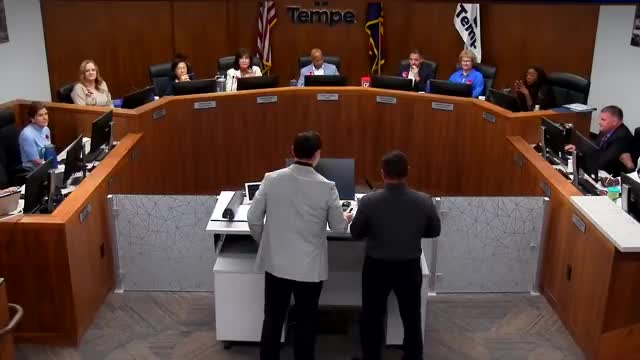Tempe updates council on park ranger program: 20,700+ reports, new cameras and body‑worn camera pilot
Get AI-powered insights, summaries, and transcripts
Subscribe
Summary
City staff reported on the park ranger program’s FY25 activity—about 20,769 reports, 16 rangers covering 52 parks, 292 connections to the HOPE outreach team, removal of abandoned property and increased community sentiment—and discussed new cameras, a body‑worn camera test and other safety equipment.
City staff provided the Tempe City Council with a year‑long update on the park ranger program, reporting activity levels, community engagement metrics, enforcement trends and planned equipment and program enhancements.
Alex Trevanovich (community services deputy director for park services) told council that 16 park rangers provided roughly 20 hours of park coverage per day across 52 park spaces during fiscal year 2025 and that rangers recorded about 20,769 reports in that period—most of them proactive patrols. Trevanovich said rangers typically work in teams of two to five on any given shift and that the majority of recorded activity took place in neighborhood and community parks.
Ruben Wilkinson Jr., parks manager, described community‑engagement work and outcomes: rangers made 292 connections to the HOPE outreach team, with 137 of those being direct, on‑site handoffs; rangers maintain event programming such as “Hike with a Ranger” and are preparing a “Bark Ranger” program to promote responsible dog ownership. Wilkinson noted that rangers removed abandoned property 937 times during the year and that drug paraphernalia was the second most‑frequent item removed. He said the department has observed a recent increase in active drug use in parks.
Monthly community‑sentiment surveys of more than 5,000 respondents showed a 1.5‑percentage‑point increase in daytime feelings of safety and a 5‑point increase at night (the nighttime satisfaction figure rose from 37% to 42%). The surveys also found that 81% of respondents were satisfied with park‑ranger interactions and 77% said ranger interactions improved their feeling of safety.
Staff described recent and planned enhancements: installation of mounted cameras and six solar‑powered mobile cameras tied to the city’s real‑time operations center; a 30‑day test of body‑worn cameras that began during the reporting period; lighting upgrades for park amenities and athletic fields; and plans to issue collapsible impact devices to rangers based on risk‑management and training reviews.
Trevanovich and Wilkinson emphasized the role of partnerships—Tempe Police Department, Hope outreach, Care 7 and other city teams—in response and follow‑up to ranger contacts. The council asked that the underlying survey results be posted online; staff said they would work to publish the community‑sentiment data publicly.
